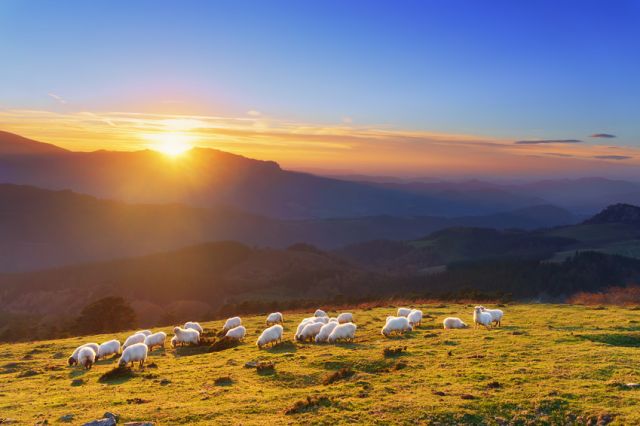- Home page
- Tourism
- Discover
- Visiting the Basque Country
- Soule
- Visiting the Basque Country
- Discover
- Tourism
Soule
« XIBEROA »
La Soule is the most typical of the Basque provinces but also the smallest and least populated. La Soule is the size of a valley, the Saison Valley (Gave de Pau is a tributary of the Saison River) stretching from Pic d’Orhy (highest Basque peak) in the South, to the Hospital Saint Blaise in the North.
 La Soule is a mountainous region with steep valleys and deep forests. You will see shepherds and their herds. It is the region of the Espadrilles (canvas sandals) and sheep cheese. You will find all the Basque culture and traditions here, including folk dances and songs and saints celebrations.
La Soule is a mountainous region with steep valleys and deep forests. You will see shepherds and their herds. It is the region of the Espadrilles (canvas sandals) and sheep cheese. You will find all the Basque culture and traditions here, including folk dances and songs and saints celebrations.
La Soule has hiking trails, natural landscapes, Béarn like architecture, Roman Art, typical isolated chapels in the heart of the mountains… what's not to like ?
Discover Mauléon, capital of the Vicomtes de Soule, Larrau, Sainte Engrâce, Tardets, l’Hôpital Saint Blaise.
HISTORY
La Soule, like the rest of the Basque Country but with its own vision, always claimed and exercised a certain independence. As early as the Middle Ages, the inhabitants of La Soule always managed not to be dependent on anyone else, and it is still the case today with a rather different agricultural economy.
La Soule represents centuries of self-management. Here it is a “Syndicat” (union), the Syndicat of Soule, which manages and runs everything. The Syndicat of Soule is only accountable to the inhabitants of La Soule. In all the other French Departments, what does not belong to individuals, belongs to the State; in La Soule it belongs to the Syndicat, therefore all the inhabitants, who co-manage it !
For example, the Syndicat obtains revenue from logging and wood pigeon hunting. Hunters come from far and wide and pay for the right to hunt.
Strolling in the forests, you will discover unusual signs such as « Forêt Syndicale de Soule » reminding you that you are in Soule, a unique region to visit for its variety of scenery !

sponsored content
LA SOULE TODAY
La Soule today is one of the sanctuaries for the preservation of the Basque identity. From the ancestral pelote games to country fairs, La Soule is an agricultural region with the main non-agricultural activity being the making of the Espadrilles in Mauléon.
THE MAKING OF the ESPADRILLES
 The Mauléon espadrilles still provide 80% of the national product today. The espadrille appeared during the 18th century, made with hemp straw imported from Asia and File in Spain, the espadrille is soft and light and, like the beret, the espadrille is a part of the traditional Basque costume.
The Mauléon espadrilles still provide 80% of the national product today. The espadrille appeared during the 18th century, made with hemp straw imported from Asia and File in Spain, the espadrille is soft and light and, like the beret, the espadrille is a part of the traditional Basque costume.
 Since its beginnings, the espadrille was exported far from the Basque Country, especially to the north of France where it was used by the coal miners.
Since its beginnings, the espadrille was exported far from the Basque Country, especially to the north of France where it was used by the coal miners.
Despite the competition, the Espadrille was always able to adapt to new materials or new products such as « Pataugas ». Today China is the main and strongest competitor and to counter this invasion, the Mauléon companies created the label « Espadrille Française » and launched the brand « France Espadrille ».
The Espadrille remains the symbol of Mauléon and also a star product of the Basque Country. Need convincing ? Come to the Espadrille Fair which takes place every year in Mauléon or go to the town's tourist office, you will see a giant espadrille which is registered in the Guinness Book of World Records.
SHEEP CHEESE
La Soule's farming and grazing land, invites you to follow the “Route des Fromages” (the cheese road) from d’Itxassou to Arette via Saint Etienne de Baigorry. You will discover well-known Basque sheep cheeses including the AOC Ossau Iraty.
The sheep cheese « Ardi Gasna » is made with unpasteurised milk. It is a bit dry and slightly salty to the taste. It is especially enjoyable with black cherry jam or as sheep curdled milk yogurt. Another speciality of the region is called « Mamia ».
Find our selection of the best addresses by clicking HERE.

sponsored content
THE BASQUE COUNTRY : A COUNTRY OF FESTIVALS AND FAIRS
The Basque country is mainly a rural region, which is very catholic, with many religious rites and with a strong growth in tourism. All of this explains why Festivals and Fairs are a tradition in the Basque country and how it provides entertainment all year long including in the smallest villages.
Traditional songs and dances are part of these fairs. The choral songs are an especially big Basque tradition typically during religious celebrations. In Soule, where the respect of tradition is strong, dances and pastorals, originating from the Basque medieval culture, set the pace of the Soule fairs.

Photos credits ©Fotolia
sponsored content




